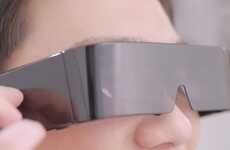While there are a number of VR headsets on display at CES 2016, OSVR's 'Hacker Dev Kit' boasts several unique features that help it stand out from bigger brands such as Oculus Rift, HTC Vive, PlayStation VR and Samsung Gear VR.
Unlike other companies, OSVR uses an open-source VR platform that allows any brand to produce its own hardware or software. This means that all of the schematics and source code for OSVR is available freely to whoever is interested. To complement its open-source design, the brand has produced a modular headset called the Hacker Dev Kit. This VR headset is equipped with a 1080p OLED panel with an impressive 120Hz refresh rate, a camera for position-tracking, an IR faceplate and the unique ability to swap items from the screen to the sensor module. The headset also boasts a modular design that can be tweaked and adjusted to suit each user's individual needs.
The Hacker Dev Kit's open-source design makes it an excellent VR accessory for consumers who are interested in upgrading or customizing their headset to suit their specific needs.
Modular VR Headsets
The 'Hacker Dev Kit' from 'OSVR' Made Its Debut at CES 2016
Trend Themes
1. Modular VR Technology - The customizable and interchangeable components of modular VR technology allows for easy upgrading and personalization that can disrupt the traditional VR market.
2. Open-source VR Platforms - The availability of schematics and source code to produce a brand's own hardware or software in an open-source VR platform provides opportunities for disruptive innovation in the VR industry.
3. Position-tracking Technology - The use of position-tracking technology in VR headsets, like the camera in the 'Hacker Dev Kit', has the potential to revolutionize VR experiences and create new market opportunities in entertainment, education, and more.
Industry Implications
1. Virtual Reality Hardware - The integration of modular and open-source design in VR hardware can create potential disruption and innovation opportunities for the VR hardware industry.
2. Gaming and Entertainment - The use of position-tracking technology in VR headsets can revolutionize the gaming and entertainment industry and provide many new market opportunities for personalized experiences.
3. Education and Training - The customizable and interchangeable components of modular VR technology can provide personalized and cost-effective solutions for educational and training programs, creating potential disruption in these industries.




